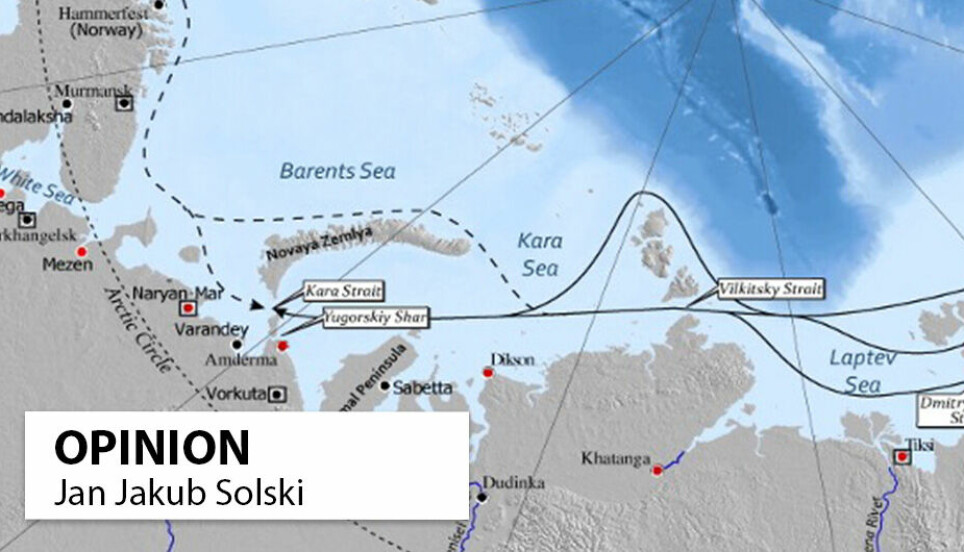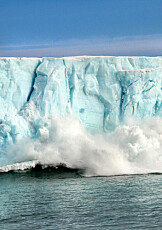Opinion:

In the shadow of the war, Russia is tightening its grip in the Arctic
OPINION: The Russian Duma is considering new legislation to ban foreign naval vessels in the Northern Sea Route. Norway must prepare to defend its rights.
In the shadow of the war in Ukraine, Russia is changing its Arctic policy. The Russian Duma is now considering new legislation to decide who will be allowed to sail through the Northern Sea Route (NSR).
The draft legislation proposes requiring foreign naval vessels and other State-owned ships to seek authorization for passage through internal waters of the NSR at least 90 days before entry.
Navigation without a permit would therefore be prohibited. This potentially conflicts with the UN Convention on the Law of the Sea's (UNCLOS) provisions on the right of innocent passage.
The Northern Sea Route connects Europe and Asia
The Northern Sea Route (NSR) is shipping route between Novaya Zemlya and the Bering Strait within the Russian exclusive economic zone, and a very unexpected casualty of the war in Ukraine. Due to the sanctions regime, and the generally strained relationship between Russia and the West, the long-held vision of an economically viable Northeast Passage (NEP) between Europe and Asia may be clinically dead.
Norway and other states must decide whether they view Russian practice as contrary to international law
Until recently, we have been primarily concerned with the commercial aspects of the NSR, and in the aura of the Arctic as a zone of peace and cooperation, we have almost forgotten its geopolitical utility, namely being a shorter passage between the Atlantic and the Pacific.
In the light of climate change and longer ice-free periods, the NSR will not only serve as a geographically shorter route for economic exchange, but also be used for non-commercial purposes, for example by foreign naval vessels.
Russian straits and their importance for the NSR
The NSR includes several narrow passages through straits between the mainland and adjacent groups of islands, all under Russian control. Due to ice and other special challenges related to shipping in the Arctic, it is virtually impossible to avoid passage through one or more of these straits.
The new Russian draft law would in the short term effectively ban foreign naval vessels and other state-owned ships from using the sea route. It may also set a precedent for the future navigation regime for the entire Northeast Passage.
Is Russian draft legislation in conflict with the law of the sea?
Who is allowed to navigate in the various areas of the ocean is regulated by the UN Convention on the Law of the Sea (UNCLOS). By dividing the ocean into maritime zones, subject respectively to navigational rights and freedoms, the UNCLOS ensures a level of stability, and keeps the potential for conflict down.
For several decades, Russia has claimed that significant parts of the NSR have the status of Russian internal waters, which implies Russian sovereignty. However, the UNCLOS gives all vessels the right to navigate through such areas, unless they can be considered historic waters.
For the 90 years of the operation of the NSR, Russia (or the Soviet Union) has not articulated historic waters claim for the waters in the NSR straits. Instead, Russia has controlled the areas by means of ambiguity, and by neither excluding, nor making a claim to historic waters. This is how Russia has averted possible diplomatic protests from other states. If Russia now adopts the new draft law, it could be the most direct expression of their understanding of the authority in the area and probably a claim that is in violation of the law of the sea.
Silence means consent
It is extremely important to follow developments in Russian Arctic legislation closely. Russia has recently clarified its Arctic baselines, adopted a new version of maritime doctrine, and the new draft law is likely to be adopted this fall.
The drafts do not explicitly mention the historic title, but the substance of the proposed legislation paves the way for this topic to arise sooner or later to substantiate the Russian claim to the areas in the NSR.
The new initiative is based on a straightforward premise that no right of navigation applies in the Russian Arctic straits. Accordingly, Russia has the right to deny or regulate access to such waters.
Russia is in the process of substantiating and defining its understanding of its sovereignty in the Arctic. Norway and other states must decide whether they view Russian practice as contrary to international law to avoid passivity being interpreted as an expression of consent to Russia's behavior. Silence means consent!
(The article is based on a blog post from the Norwegian Centre for the Law of the Sea)
FURTHER READING:
Share your science or have an opinion in the Researchers' zone
The ScienceNorway Researchers' zone consists of opinions, blogs and popular science pieces written by researchers and scientists from or based in Norway. Want to contribute? Send us an email!





























